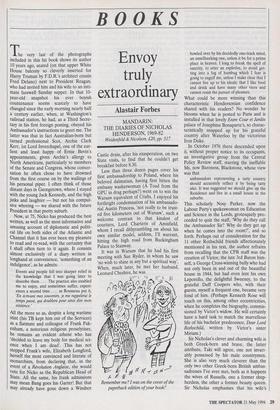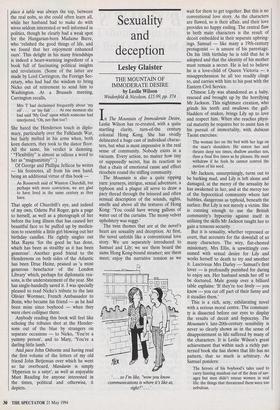BOOKS
Envoy truly extraordinary
Alastair Forbes
MANDARIN: THE DIARIES OF NICHOLAS HENDERSON, 1969-82 Weidenfeld & Nicolson, £20, pp. 517 The very last of the photographs included in this fat book shows its author 10 years ago, seated (on that upper White House balcony so cleverly inserted for Harry Truman by F.D.R.'s architect cousin Fred Delano) next to President Reagan, who had invited him and his wife to an inti- mate farewell Sunday supper. In that 10- year-old snapshot his ever boyish countenance seems scarcely to have changed since the early morning nearly half a century earlier, when, at Washington's railroad station, he had, as a Third Secre- tary in his first foreign posting, obeyed his Ambassador's instructions to greet me. The latter was that in fact Australian-born but turned professional Scot, Archie Clark Kerr, 1st Lord Inverchapel, one of the ear- liest and least happy of Ernie Bevin's appointments, given Archie's allergy to North Americans, particularly to members of the Senate and Congress, whose conver- sation he often chose to have drowned from the first course on by the wailings of his personal piper. I often think of those distant days in Georgetown, where I stayed with the young Jack Kennedy, and the high links and laughter — but not his compul- sive whoring — we shared with the future President in that pretty suburb.
Now, at 75, Nicko has produced the best written, as well as the most informative and amusing account of diplomatic and politi- cal life on both sides of the Atlantic and Channel that it has ever been my pleasure to read and re-read, with the certainty that I shall often turn to it again. It consists almost exclusively of a diary written in longhand at convenience, 'something of an indulgence', as he admits:
Events and people fell into sharper relief in the knowledge that I was going later to describe them . . . The practice also enabled me to enjoy, and sometimes suffer, experi- ences a second time .. . as Rousseau put it, 'En ecrivant mes souvenirs, je me rappelerai le temps passe, qui doubiera pour ainsi dire mon existence.'
All the more to as, despite a long wartime stint (his TB kept him out of the Services) as a flatmate and colleague of Frank Pak- enham, a notorious religious proselytiser, he remains an evident atheist who has 'decided to leave my body for medical sci- ence when I am dead'. This has not stopped Frank's wife, Elizabeth Longford, herself the most convinced and literate of monarchists, from declaring that, in the event of a Revolution Anglaise, she would vote for Nicko as the Republican Head of State. All the same, his frank admissions may mean Bang goes his Garter! But that may already have gone down a Windsor
Castle drain, after his exasperation, on two State visits, to find that he couldn't get breakfast before 8.30.
Less than three dozen pages cover his first ambassadorship to Poland, where his beloved dalmatian, having first bitten the embassy washerwoman (A Toad from the GPU in drag perhaps?) went on to win the Warsaw equivalent of Crufts. I enjoyed his forthright condemnation of his ambassado- rial Austin Princess, 'not really to be trust- ed five kilometers out of Warsaw', such a welcome contrast to that kindest of courtiers, Lord Charteris of Amisfield, whom I recall dithyrambling on about his own similar model, seldom, I'll warrant, hitting the high road from Buckingham Palace to Stanway.
It was in Warsaw that he had his first meeting with Sue Ryder, in whom he saw 'no wish to shine in any but a spiritual way'. When, much later, he met her husband, Leonard Cheshire, he was Remember me? I was on the cover of the paperback edition of your book!'
bowled over by his decidedly one-track mind, an unselfseeking one, unless it be for a prime place in heaven. I long to break the spell of sanctity, to utter an expletive, to avoid get- ting into a fog of humbug which I fear is going to engulf me, unless I make clear that I cannot live up to his ideals; that I like food and drink and have many other vices and cannot resist the pursuit of pleasure.
What could be more winning than this characteristic Hendersonian confidence shared with his readers? No wonder he blooms when he is posted to Paris and is installed in that lovely Entre Cour et Jardin palace of Josephine Bonaparte's, so charac- teristically snapped up for his grateful country after Waterloo by the victorious Iron Duke.
In October 1976 there descended upon it, without proper notice to its occupants, an investigative group from the Central Policy Review staff, starring the ineffable Ms, now Baroness, Blackstone, whose view was that
ambassadors representing a tatty country should accurately reflect it by being tatty also. It was suggested we should give up the Residence and live in a small house in the suburbs.
This scholarly Nosy Parker, now the Labour Party's spokeswoman on Education and Science in the Lords, grotesquely pro- ceeded to quiz the staff, 'Why do they call the Ambassador Sir? Why do they get up when he comes into the room?', and so forth. Perhaps out of consideration for the 11 other Rothschild friends affectionately mentioned in his text, the author refrains from recalling that the CPR staff was the creation of Victor, the late 3rd Baron him- self, a George Cross-winning bully who had not only been in and out of the beautiful house in 1944, but had even lent his own Leporello, the delightful Sweeney, to the grateful Duff Coopers who, with their guests, myself a frequent one, became very fond of him. (Perhaps Kenneth Rose will touch on this, among other eccentricities, when he completes the biography, commis- sioned by Victor's widow. He will certainly have a hard task to match the marvellous life of his bachelor predecessor, Dear Lord Rothschild, written by Victor's sister Miriam.)
Sir Nicholas's clever and charming wife is both Greek-born and brave, the latter attribute, Taki will agree, one not invari- ably possessed by his male countrymen. She is also very much cleverer than the only two other Greek-born British ambas- sadresses I've ever met, both as it happens the wives of Russells, one a former shep- herdess, the other a former beauty queen. Sir Nicholas emphasises that his wife's place a table was always the top, between the real nobs, so she could often learn all, while her husband had to make do with wives seldom interested or well informed in politics, though he clearly had a weak spot for the Hungarian-born Madame Barre, who 'relished the good things of life, and we found that her enjoyment enhanced ours'. This delight in his many friendships is indeed a heart-warming ingredient of a book full of fascinating political insights and revelations. (Some of the latter are made by Lord Carrington, the Foreign Sec- retary, who had had the wisdom to bring Nicko out of retirement to send him to Washington. At a Brussels meeting, Carrington recalls,
Mrs T had declaimed frequently about 'my oil' . . . or 'my fish' . . . At one moment she had said 'My God' upon which someone had interjected, 'Oh, not that too'!
She hated the Henderson touch in diplo- macy, particularly over the Falldands War, but fairly melted in his arms when, both keen dancers, they took to the dance floor. All the same, his verdict is damning.
"Flexibility" is almost as odious a word to her as "magnanimity" '.) Of George and Phillipa Jellicoe he writes — his footnotes, all from his own hand, being an additional virtue of this book —
As Roosevelt said of Winston Churchill, but perhaps with more conviction, we are glad to have lived in the same century as they have.
That apple of Churchill's eye, and indeed of my own, Odette Poi Roger, gets a page to herself, as well as a photograph of her before the long illness that has caused her beautiful face to be puffed up by medica- tion to resemble a little girl blowing out her birthday candles. He rightly singles out Max Rayne 'for the good he has done, which has been as stealthy as it has been generous'. Another good friend to the Hendersons on both sides of the Atlantic has been Drue Heinz, praised as 'a most generous benefactor of the London Library' which, perhaps for diplomatic rea- sons, is the understatement of the year. She has single-handedly saved it. I was specially pleased to read Nieko's tribute to the late Olivier Wormser, French Ambassador to Bonn, who became his friend — as he had been mine since boyhood — when they were chers collegues there.
Anybody reading this book will feel like echoing the tributes shot at the Hender- sons out of the blue by strangers on separate occasions — to Nicko, 'You're a yummy person', and to Mary, 'You're a darling little lamb.'
And pace John Osborne and having read the first volume of the letters of my old friend John Betjeman over which he went so far overboard, Mandarin is simply 'Hyperion to a satyr', as well as enjoyable Must Reading for anyone interested in the times, political and otherwise, it depicts.





































































 Previous page
Previous page